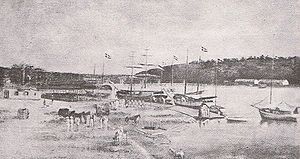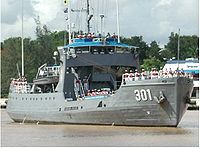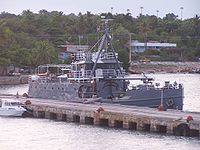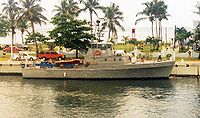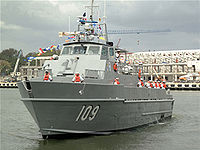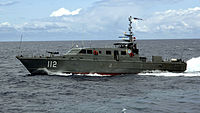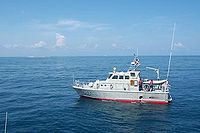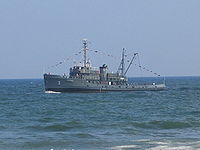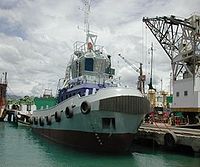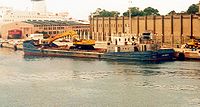- Dominican Navy
-
Dominican Navy
Marina de Guerra Dominicana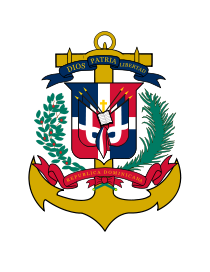
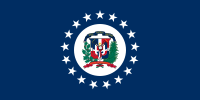
Emblem and Naval Jack of the Dominican NavyActive April 15, 1844 - present Country Dominican Republic Branch Navy Type Navy Size 4,000 personnel, 33 ships Anniversaries April 15 Engagements Dominican War of Independence
Dominican Civil WarCommanders Current
commanderVice Adm. Nicolas Cabrera Arias Notable
commandersAdm. Juan Bautista Cambiaso
The Navy of the Dominican Republic or Marina de Guerra Dominicana (MdeG), is one of the three branches of the Military of the Dominican Republic, together with the Army and the Air Force.Contents
History
After the Dominican Republic gained its independence from Haiti on February 27, 1844, there was a need to create a Naval fleet. Three schooners were commissioned for this, the "Separación Dominicana" (flagship), the "María Chica" and the "Leonor". These were the original three Dominican vessels which were incorporated in the newly created Dominican as authorized by the Junta Central Gubernativa with the Naval Act of 1844 on April 23, 1844, the same day the Navy was created. Even though, the three schooners had been in action since April 15 at the Battle of Tortuguero, where they were led by Adm. Juan Bautista Cambiaso and sank 6 Haitian ships.
During the Dominican Civil War, a part of the Navy opposed the "Return to the Legitime Government" which was victim of a Coup d'état on September 1963 and used the frigate F-451 "Mella" to bombard the National Palace with the help of the Air Force.
On the other side of the conflict, The Elite Navy Force "Hombres Ranas" (Frog Men) under Commander Ramon Montes Arache, fought to bring the 1962 Democratically Elected President back in office. The other navy commanders were affraid of "Hombres Ranas" taking control over "Las Calderas" Naval Base. As per local residents in that community, people made jokes on how scared they were, after they killed a Dolphin, which they mistakenly thought was a "Frog Man". See United States occupation of the Dominican Republic (1965–1966)
The Navy maintaines several naval stations and detachments, but has two main bases:
- Base Naval "27 de Febrero", located in the city of Santo Domingo, the Chief of Staff and the Naval Academy "Vice-Admiral Cesar de Windt Lavandier" are located here.
- Base Naval de Las Calderas, located in Peravia Province, is the largest Naval Base. The Bahia Las Calderas Naval Shipyard (ANABALCA)is located here. This shipyard is responsible for the maintenance of naval units of the fleet, as well as civilian vessels. Military and civilian vessels, such as tugs, boats, barges, pilot boats have also been built at this site.
List of current vessels
Class Name Origin In service Notes Image Patrol Division USCG 180' Class Seagoing Buoy Tender Cutters (Mesquite Class B) [1] PA-301 Almirante Didiez Burgos  United States
United States1 The Flagship of the Dominican Navy, transferred to the Navy by the USCG in 2001. It is used for coastal patrol, navigational aid maintenance, midshipman cruises, humanitarian assistance, naval training exercises, troop transport, and at sea refueling. It is armed with two M-2 0.50 caliber machine guns and two single Oerlikon 20 mm cannons, but it can also be armed with two extra 0.50 cal. machine guns, two M-60 machine guns and one 3/50 (single) gun. USCG 133' White Class Coastal Buoy Tender PM-203 Tortuguero
PM-204 Capotillo United States
United States2 The Tortuguero and the Capotill were transferred to the Navy by the USCG in 1999 and in 2002, respectively. They are used for coastal patrol, navigational aids maintenance, midshipman cruises, humanitarian assistance, naval training exercises, and at sea refueling. They are armed with two M-2 0.50 cal. machine guns. Coast Guard Division USCG Point Class Cutters GC-101 Aries
GC-105 Antares
GC-110 Sirius United States
United States2 They are used for coastal and riverine patrol, search and rescue operations, anti-narcotics operations. They are armed with two M-2 0.50 cal. machine guns. Seaward Class Patrol Boat GC-103 Procion
GC-104 Aldebarán
GC-106 Bellatrix
GC-108 Capella United States
United States4 Were acquired between 1968 and 1971. Between 2003 and 2005 they underwent a general renovation, receiving new engines,new generators, new radars, GPS navigation system, auto-pilot system, etc. They are used for coastal and river patrols, search and rescue operations, and anti-narcotics operations. They are armed with three M-2 0.50 cal. machine guns. Swiftships 110' Class Patrol Boat GC-107 Canopus
GC-109 Orión United States
United States2 Built in 1984 by the Swiftships shipbuilders. Between 2003 and 2005 they underwent a general renovation, receiving new engines, new generators, new radars, a GPS navigation system, and an auto-pilot system. They are used for coastal and river patrols, search and rescue operations, and anti-narcotics operations. They are armed with two M-2 0.50 cal. machine guns, one Oerlikon 20mm cannon (single) and one M-60 machine gun. Swiftships Interceptor Class Patrol Boat GC-112 Altair  United States
United States1 Built in 2003 by the Swiftships shipbuilders. It is used for coastal and river patrols, search and rescue operations, and anti-narcotics operations. It is armed with two M-2 0.50 cal. machine guns and one Oerlikon 20mm cannon (single). Salvage and Rescue Unit Damen Stan Patrol 1500 Class Patrol Boat LR-151 Hamal
LR-152 Vega
LR-153 Deneb
LR-154 Acamar Dominican Republic
Dominican Republic3 These patrol boats were built in The Dominican Republic by Astilleros Navales Bahia Las Calderas (ANABALCA) in 2004. They are used for coastal and river patrols, search and rescue operations, anti-narcotics operations. These patrol boats are unarmed, but they carry M-16 rifles and can be fitted with a M-60 machine gun. LR-152 Vega sank while underway to Las Calderas Naval base. Interceptor Boat Division Interceptor Nor-Tech 4300 Class LR-155 Castor
LR-156 Pollux
LR-157 Atria
LR-158 Shaula United States
United States4 These Nor-techs were built without bunks and water tanks to fit 100 extra gallons of fuel and other equipment, such as a FLIR camera and communications equipment. They are used for coastal and river patrols, search and rescue operations, anti-narcotics operations, and go-fast interdiction. These patrol boats are unarmed, but the carry M-16 rifles. 32' Defender Class Boston Whaler Justice Speedboat LI-161 "Elnath"
LI-162 "Polaris"
LI-163 "Nunki"
LI-164 "Dubhe"
LI-165 "Denebola"
LI-166 "Regulus"
L-167 "Acrux" United States
United States7 They are used for coastal and river patrols, search and rescue operations, anti-narcotics operations, and go-fast interdiction. They are armed with a M-60 machine gun(165-166-167 are fitted with 3 M-60 mounts) and they carry M-16 rifles. 28' Speedboat LR-159 "Enif"
LR-160 "Rigel" United States
United States2 Auxiliary Vessels Division Ocean Tug ATR 165´Class RM-1 Guarocuya  United States
United States1 Before serving in the Dominican Navy, it was civilian tug used by smugglers to transport illegal drugs. After being confiscated by the Navy it underwent a general renovation and was incorporated for Naval operations. Damen Stan Tug 2608 Class RM-2 Guarionex
RM-3 Guaroa Dominican Republic
Dominican Republic2 Built in the Dominican Republic by ANABALCA. They are currently being operated on a lease by the company "Remolcadores Dominicanos". Dredgers Ships BD-12 San Pedro  United States
United States1 Oil Fuel Barge BC-1 Mencia  United States
United States1 Landing Craft Utility LCU-1600 Class LD-31 Neyba  United States
United States1 Floating Docks DF-1  United States
United States1 Refurbished and operated by ANABALCA. Notes:
- The Dominican Navy has other vessels of less draft.
Ranks
In the Dominican Navy, the ranks are organized in Admirals Officers, Senior Officers, Junior Officers and Enlisted.
Admirals Officers Insignia Title Admiral
(Almirante)Vice Admiral
(Vicealmirante)Rear Admiral
(Contralmirante)Senior Officers Insignia Title Captain
(Capitan de Navio)Commander
(Capitan de Fragata)Lieutenant Commander
(Capitan de Corbeta)Junior Officers Insignia Title Lieutenant
(Teniente de Navio)Lieutenant Junior Grade
(Alferez de Navio)Ensign
(Alferez de Fragata)Cadet
(Guardiamarina)Enlisted Insignia Title Chief Petty Officer
(Sargento Mayor)Petty Officer 1st Class
(Sargento)Petty Officer 2nd Class
(Cabo)E1
(Marinero)The Dominican Naval Auxiliary Corps is a civilian force that possesses its own resources to assist in search operations, rescue and environmental protection. This organization was created by the Executive by Decree 887-09 and it is composed of a group of business and professional volunteers.
The organization operates private boats, barges and aircraft made available to the Navy, in order to assist with non-military activities or public order and safety at sea. The Dominican Naval Auxiliary has a presence in the north, northeast, east, south and center of the country.
The Naval Commandos are the Special Operations component of the Dominican Navy and are only employed in emergency situations. The Naval Commandos are capable of undertaking unconventional warfare, hostage rescue, counter-terrorism, VBSS (Visit Board Search and Seizure) and are experts in handling explosives and amphibious operations. They are also trained in parachuting, hand to hand combat, CQC and other key skills. The team's armament includes the M16 rifle with the M203 grenade launcher, the Colt M-4A1, M-14 rifle, Mossberg 500 shotgun, the M-60 machine gun and small arms. The team operates inflated zodiac boats, RHIBs, and night vision goggles, among other equipment.
Some team members first saw action during Operation Iraqi Freedom. Dominican troops, comprising a battalion of special components of the Dominican Armed forces, were under constant mortar attacks but suffered no casualties. While in Iraq, the troops were serving in the Plus Ultra Brigade, which was under Spanish command and operating in Southern Iraq.
Future plans
The Navy plans to build a ship called a "Multipurpose Platform", which will be between 164 and 190 feet long. Its construction will be in Bahia de Las Calderas, at the "Astilleros Navales Bahia de Las Calderas" (ANABALCA) shipyard. All the installations of the Dominican Navy located in Santo Domingo: the Naval Base, the Naval academy, the military docks and the Dredging, Dams and Beacons department, will be transferred to the municipality of Andres Boca Chica. There are also plans for the construction of a new building in Santo Domingo that will house the Chief of Staff.
See also
References
- ^ Wertheim, Eric (2007). Naval Institute Guide to Combat Fleets of the World. Annapolis, Maryland: Naval Institute Press. pp. 163. ISBN 159114955X. http://books.google.com/books?id=TJunjRvplU4C&pg=PA163&lpg=PA163&dq=Almirante+Didiez+Burgos+Citrus&source=bl&ots=wKl3nrg44E&sig=_NqgRx2P9THVKxPE4e351zKmxTg&hl=en&ei=R3y9SarMLMWYtwf2_YT5Cw&sa=X&oi=book_result&resnum=1&ct=result#PPA163,M1.
External links
- Marina de Guerra Dominicana (Spanish)
Categories:- Dominican Navy
- Military of the Dominican Republic
- Military units and formations established in 1844
Wikimedia Foundation. 2010.

